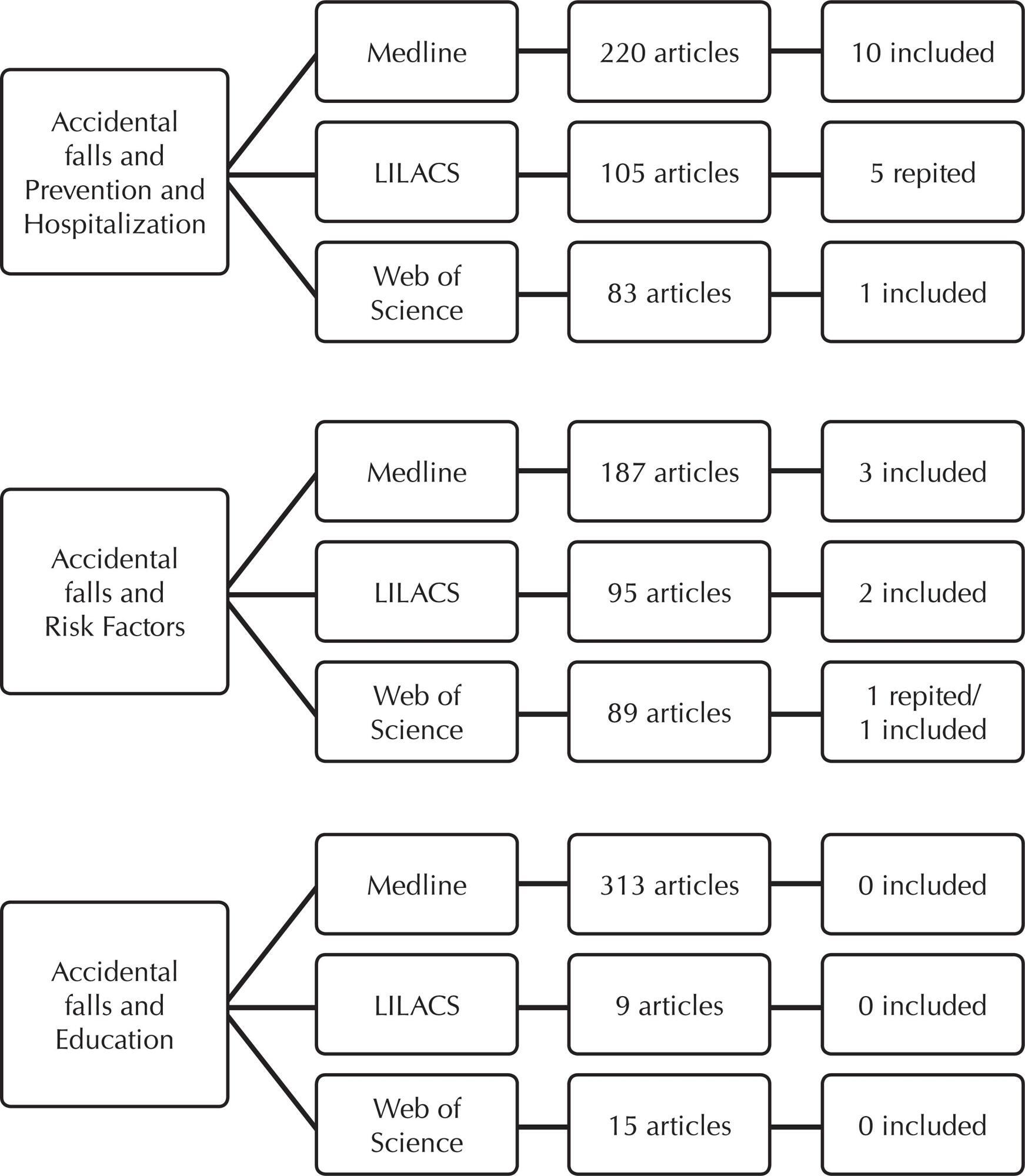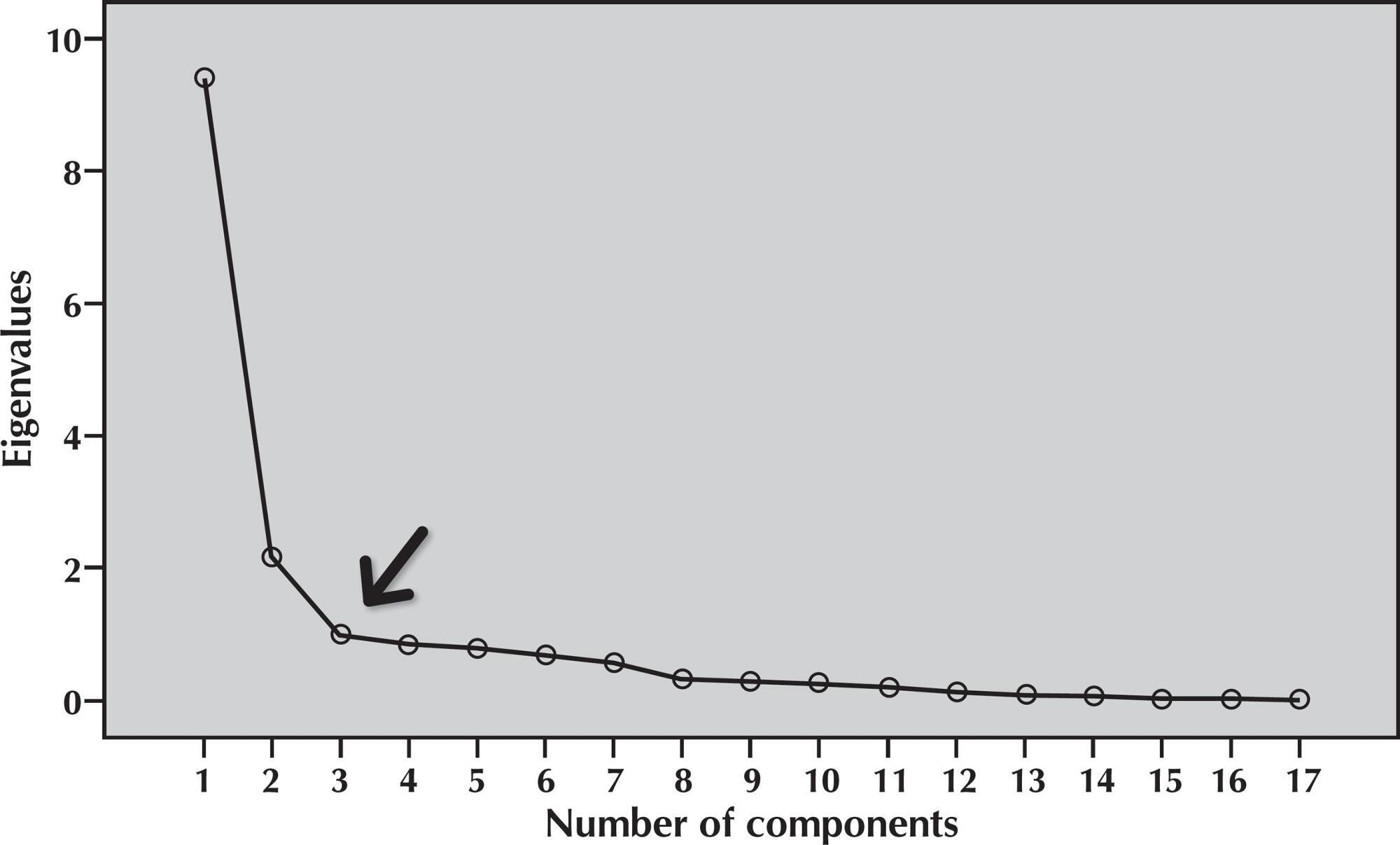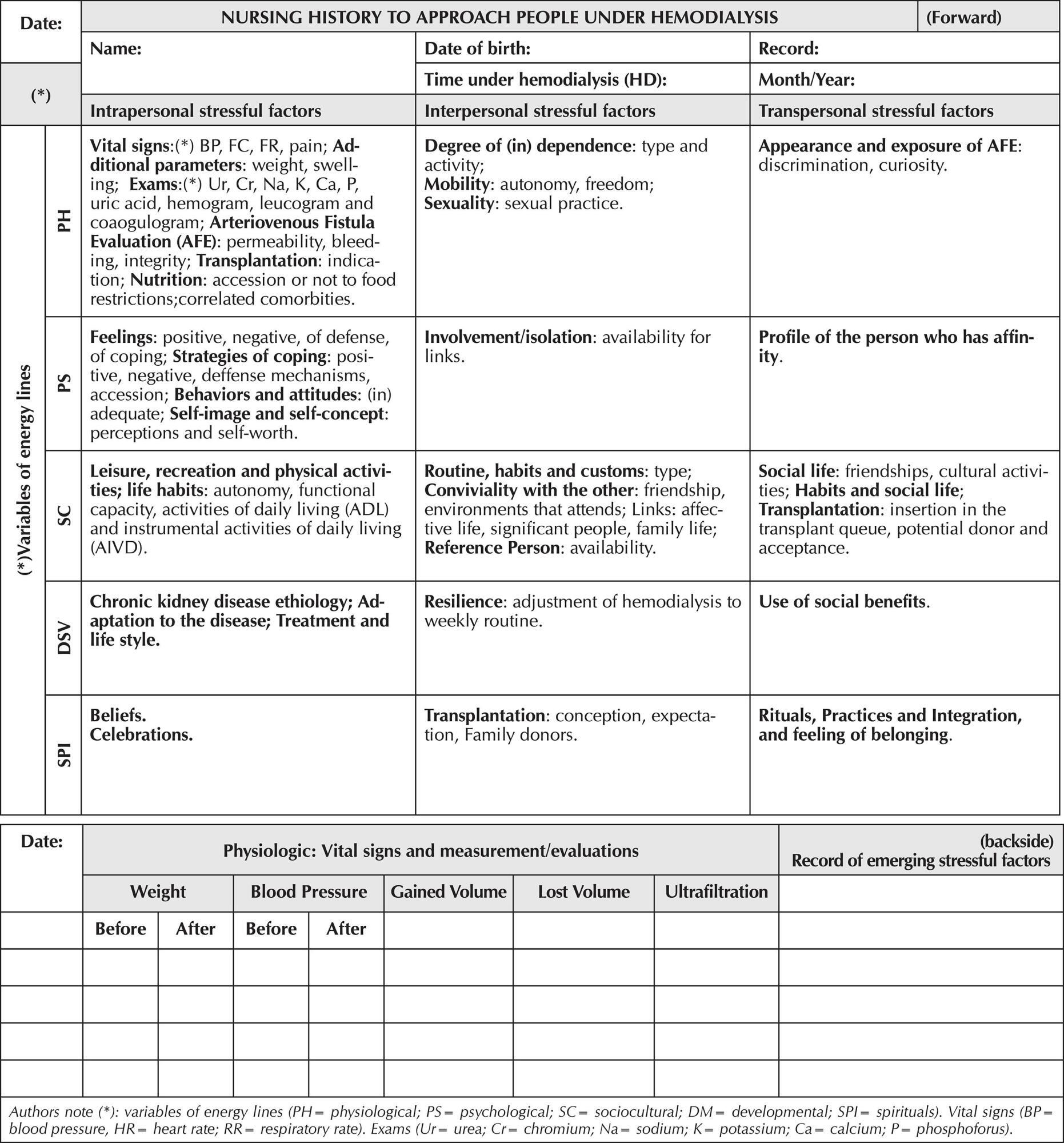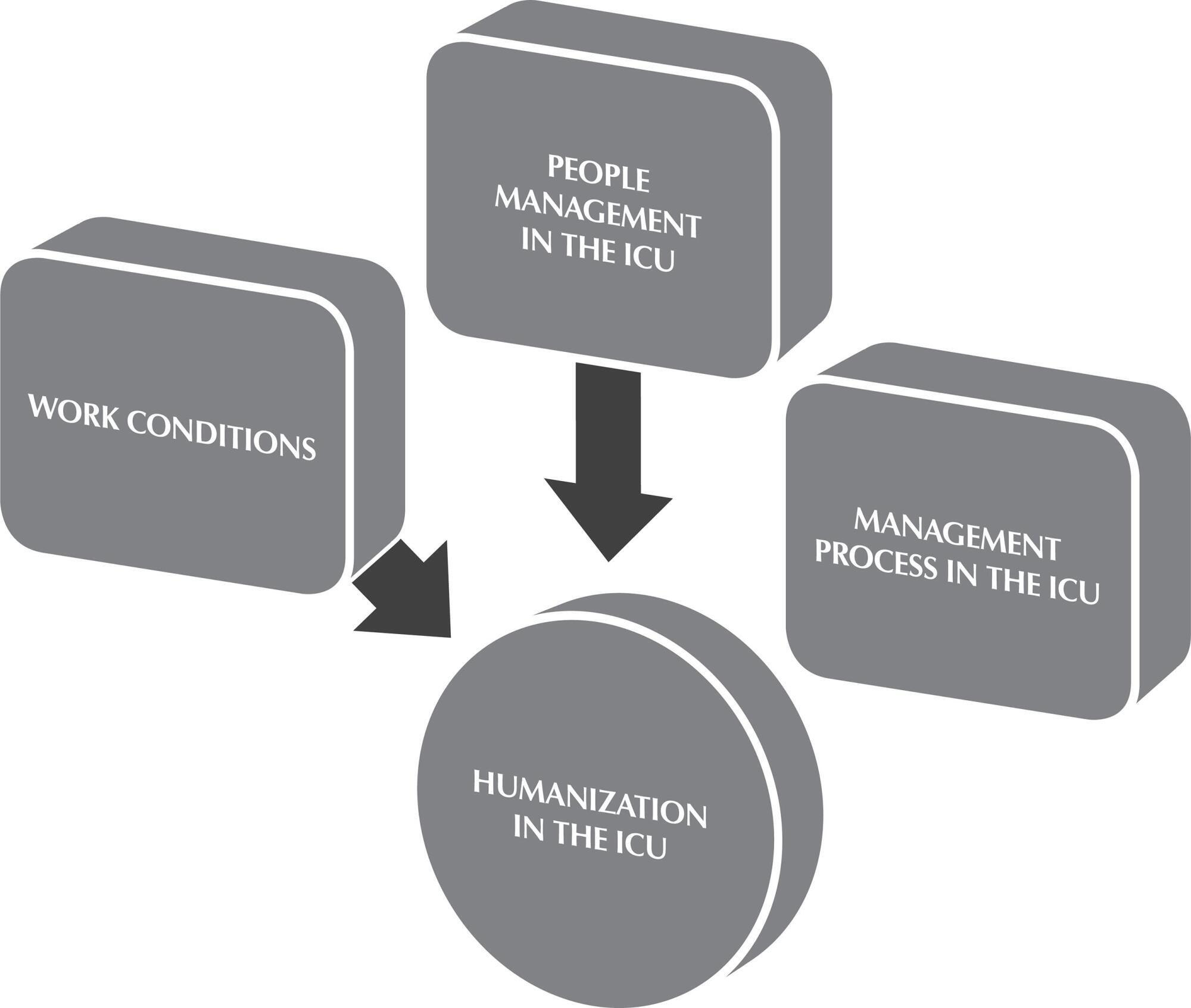-
REVIEW01-01-2018
Conceptual definitions of indicators for the nursing outcome “Knowledge: Fall Prevention”
Revista Brasileira de Enfermagem. 2018;71(2):431-439
Abstract
REVIEWConceptual definitions of indicators for the nursing outcome “Knowledge: Fall Prevention”
Revista Brasileira de Enfermagem. 2018;71(2):431-439
DOI 10.1590/0034-7167-2016-0686
Views0See moreABSTRACT
Objective:
to construct conceptual definitions for indicators of nursing outcome Knowledge: Fall Prevention, selected for evaluation of hospitalized patients with the nursing diagnosis Risk for falls.
Method:
integrative literature review performed in the LILACS, MEDLINE and Web of Science databases, comprising articles published in English, Spanish and Portuguese languages from 2005 to 2015.
Results:
the final sample of the study was composed of 17 articles. The conceptualizations were constructed for 14 indicators of nursing outcome Knowledge: Fall Prevention focused on hospitalized patients.
Conclusion:
the theoretical support of the Nursing Outcomes Classification (NOC), through the process of constructing the conceptual definitions of the indicators of its results, allows nurses to accurately implement this classification in clinical practice and to evaluate the effectiveness of their interventions through the change of the patients’ status over time.

-
REVIEW01-01-2018
Integrative literature review: sleep patterns in infants attending nurseries
Revista Brasileira de Enfermagem. 2018;71(2):424-430
Abstract
REVIEWIntegrative literature review: sleep patterns in infants attending nurseries
Revista Brasileira de Enfermagem. 2018;71(2):424-430
DOI 10.1590/0034-7167-2016-0480
Views0See moreABSTRACT
Objective:
To identify evidence available in the literature about sleep patterns of infants attending nurseries.
Method:
An integrative review of studies published in Portuguese, English or Spanish available in full text on LILACS, CINAHL, and PubMed databases. The following descriptors sono, lactente and creches or berçários (in Portuguese) and sleep, infant and childcare or nurseries were used for LILACS, CINAHL and Pubmed, respectively. Nine studies were selected and analyzed.
Results:
The main component explored in the studies about sleep pattern is the sleep position of the infants, due to its association with sudden infant death syndrome. The results pointed to the need to promote and develop written guidelines regarding behavioral practices to reduce the risk of this phenomenon.
Conclusion:
Evidence has identified sleep issues, mainly regarding the sleep position of the infant and the environment where the infant sleeps, showing that it is critical to set routines and interventions to improve the quality of sleep care of infants attending nurseries.
-
REVIEW01-01-2018
The nurses’ work process in different countries: an integrative review
Revista Brasileira de Enfermagem. 2018;71(2):413-423
Abstract
REVIEWThe nurses’ work process in different countries: an integrative review
Revista Brasileira de Enfermagem. 2018;71(2):413-423
DOI 10.1590/0034-7167-2016-0468
Views0See moreABSTRACT
Objective:
To analyze the characteristics of nurses’ work process in different countries.
Method:
We have used the integrative review method and selected 84 publications (articles, theses and dissertations) in national and foreign thesis banks and databases. We analyzed the evidence based on dialectical materialism.
Results:
The rejection of managerial tasks hides the singularity of nurses’ work, due to the failure to understand the inseparable nature of managerial and healthcare tasks, given that it is what provides the expertise to coordinate the nursing work process and guide the healthcare work processes. The social and technical division is present in the work process in all countries studied, albeit in different ways. The nurse’s position in the healthcare work process is subordinated to that of the physician.
Conclusion:
The characteristics are similar. The rejection of the dual nature of the work by nurses themselves due to alienation results in the non-recognition of their own work.
-
RESEARCH01-01-2018
Validation and reliability of the scale Self-efficacy and their child’s level of asthma control
Revista Brasileira de Enfermagem. 2018;71(2):406-412
Abstract
RESEARCHValidation and reliability of the scale Self-efficacy and their child’s level of asthma control
Revista Brasileira de Enfermagem. 2018;71(2):406-412
DOI 10.1590/0034-7167-2016-0528
Views0See moreABSTRACT
Objective:
To evaluate the psychometric properties in terms of validity and reliability of the scale Self-efficacy and their child’s level of asthma control: Brazilian version.
Method:
Methodological study in which 216 parents/guardians of children with asthma participated. A construct validation (factor analysis and test of hypothesis by comparison of contrasted groups) and an analysis of reliability in terms of homogeneity (Cronbach’s alpha) and stability (test-retest) were carried out.
Results:
Exploratory factor analysis proved suitable for the Brazilian version of the scale (Kaiser-Meyer-Olkim index of 0.879 and Bartlett’s sphericity with p < 0.001). The correlation matrix in factor analysis suggested the removal of item 7 from the scale. Cronbach's alpha of the final scale, with 16 items, was 0.92.
Conclusion:
The Brazilian version of Self-efficacy and their child’s level of asthma control presented psychometric properties that confirmed its validity and reliability.

-
RESEARCH01-01-2018
Spiritual well-being and hope in the preoperative period of cardiac surgery
Revista Brasileira de Enfermagem. 2018;71(2):398-405
Abstract
RESEARCHSpiritual well-being and hope in the preoperative period of cardiac surgery
Revista Brasileira de Enfermagem. 2018;71(2):398-405
DOI 10.1590/0034-7167-2016-0642
Views0See moreABSTRACT
Objective:
To characterize relations between spiritual well-being and hope of patients in the preoperative period of cardiac surgery.
Method:
Exploratory cross-sectional study with quantitative approach, performed in the infirmaries of a reference hospital in cardiology. We evaluated 69 patients hospitalized in preoperative period of myocardial revascularization, valve repair or replacement.
Results:
We verified that patients hold relevant scores of hope and welfare in all areas, being the existential well-being significantly lower than the religious one. The average of the spiritual well-being score was below the required to be considered high. There was no significant correlation between welfare and hope.
Conclusion:
Nurses should develop a watchful eye to these issues, be trained in specific protocols of spiritual anamnese and use the real moments of care to strengthen the patients.
-
RESEARCH01-01-2018
Body consciousness of people with intestinal stomach: A phenomenological study
Revista Brasileira de Enfermagem. 2018;71(2):391-397
Abstract
RESEARCHBody consciousness of people with intestinal stomach: A phenomenological study
Revista Brasileira de Enfermagem. 2018;71(2):391-397
DOI 10.1590/0034-7167-2016-0666
Views0See moreABSTRACT
Objective:
to describe the bodily awareness of people with stomies.
Method:
a descriptive study with a qualitative approach, carried out in the Ostomized Association of the State of Ceará, through semi-structured interviews with ten people with intestinal stomies, according to Merleau-Ponty’s phenomenological thinking.
Results:
two categories of analysis emerged: The body that I have, in which the sensations of deficiency, imperfection and bad odor add to the feeling of strangeness towards one’s own body, affecting the way of being in the world of each deponent; and The body that others perceive, in which the stoma is seen as an embarrassing and complex experience, since it hampers daily activities and conviviality with other people.
Final considerations:
The corporeal consciousness of Being-Stomp-in-the-world requires the movement to reconstruct the senses of the body from the body I have and from that which others perceive.
-
RESEARCH01-01-2018
Construction and validation of forms: systematization of the care of people under hemodialysis
Revista Brasileira de Enfermagem. 2018;71(2):379-390
Abstract
RESEARCHConstruction and validation of forms: systematization of the care of people under hemodialysis
Revista Brasileira de Enfermagem. 2018;71(2):379-390
DOI 10.1590/0034-7167-2015-0130
Views0See moreABSTRACT
Objective:
create and validate forms to subsidize the systematization of nursing care with people on hemodialysis.
Method:
institutional case study to support the systematization of assistance from the construction of forms for data collection, diagnoses, interventions and nursing results, using cross-mapping, Risner’s reasoning, Neuman’s theory, taxonomies of diagnoses, interventions and nursing results with application in clinical practice and validation by focal group with specialist nurses.
Results:
18 people on hemodialysis and 7 nurses participated. Consensus content of form matter with specialist nurses in the area (Crombach 0.86). The papers captured 43 diagnoses, 26 interventions and 78 nursing results depicting human responses in their singularities.
Final considerations:
the validated forms fill a gap by enabling the capture of human responses from people on hemodialysis and by subsidizing the planning of nursing care on a scientific basis.

-
RESEARCH01-01-2018
Perception of nursing workers humanization under intensive therapy
Revista Brasileira de Enfermagem. 2018;71(2):372-378
Abstract
RESEARCHPerception of nursing workers humanization under intensive therapy
Revista Brasileira de Enfermagem. 2018;71(2):372-378
DOI 10.1590/0034-7167-2016-0485
Views0See moreABSTRACT
Objective:
understand the perception of nursing workers working in the Intensive Care Unit (ICU) regarding humanization in the work environment.
Method:
we used the reference of phenomenology, structure of the phenomenon. Participated 25 nursing professionals working in an adult ICU of a university hospital, through focused interviews, answering the guiding question: What do you understand by humanization of the working conditions of the nursing team working in the ICU?
Results:
the analysis revealed the themes: humanization in the ICU; working condition in the ICU; management of people in the ICU and management process in the ICU.
Final considerations:
humanization is necessary through the change of the work environment and the managerial process, privileging the participatory management model as a way to transform theory into practice and value the worker.

-
01-01-2015
Symbolic effects capitalized by nurses from the National Institute of Cancer in Brazil (1980 – 1990)
Revista Brasileira de Enfermagem. 2015;68(2):284-290
Abstract
Symbolic effects capitalized by nurses from the National Institute of Cancer in Brazil (1980 – 1990)
Revista Brasileira de Enfermagem. 2015;68(2):284-290
DOI 10.1590/0034-7167.2015680214i
Views0See moreABSTRACT
Objective:
to describe the strategies of nurses in the National Institute of Cancer to disseminate its scientifi c capital and discuss the symbolic effects capitalized in the fi eld of oncology in the 1980s.
Method:
historical social studies, with primary sources consisting of written documents and oral reports, and as secondary sources, articles and books on the subject, based on the French sociologist Pierre Bourdieu’s concepts of scientifi c capital and habitus.
Results:
it revealed the effective performance of nurses in this Institute on policies of cancer prevention and control and strategies used in the teaching of oncology nursing at the undergraduate level. In conclusion, nursing stands out in this context, through the dissemination of its scientifi c knowledge, as a participant in the construction of a scientifi c fi eld of oncology nursing in Brazil, highlighting the occupation of important social areas.
-
01-01-2015
Perception of nursing undergraduate students on self-aging
Revista Brasileira de Enfermagem. 2015;68(2):278-283
Abstract
Perception of nursing undergraduate students on self-aging
Revista Brasileira de Enfermagem. 2015;68(2):278-283
DOI 10.1590/0034-7167.2015680213i
Views1See moreABSTRACT
Objective:
to analyze the perceptions of nursing undergraduate students on their self-aging process.
Method:
qualitative study carried out between August and September, 2011 with 18 nursing undergraduate students of a public university in Salvador, Bahia. The interviews were analyzed by means of the Content Analysis method.
Results:
the following thematic concept was apprehended: Perceptions of nursing undergraduates on their self-aging, which generated two subcategories: A) The “don’t think about it” process; B) The context infl uencing the process.
Conclusion:
undergraduates reveal that the aging process is an intrinsic factor to human development. Family ties, spirituality and physical activity would be key mechanisms toward active aging. However, students also reported that their accelerated and stressed social lifestyles led to inadequate habits, such as the consumption of fast food and alcohol, which become negative infl uences in their aging process.
-
01-01-2015
Non-conventional technologies for data collection in Brazilian dissertations and theses
Revista Brasileira de Enfermagem. 2015;68(2):269-277
Abstract
Non-conventional technologies for data collection in Brazilian dissertations and theses
Revista Brasileira de Enfermagem. 2015;68(2):269-277
DOI 10.1590/0034-7167.2015680212i
Views0See moreABSTRACT
Objective:
to characterize non-conventional technologies used for data collection of dissertations and theses available in the Catalog of Theses and Dissertations (CEPEn) of the Brazilian Nursing Association (ABEn).
Method:
this is a documentary research, whose data were collected in the catalogs of theses and dissertations available at the ABEn website, from Volumes XIX to XXI. The indicators collected were: academic level; educational institution; year; qualification of the author; setting; non-conventional technology used; type of technology; association with conventional techniques; methodological design; benefi ts and methodological limitations.
Results:
from a total of 6346 studies, only 121 (1.91%) used non-conventional technologies for data collection, representing the fi nal sample of the study.
Conclusion:
it is concluded that Brazilian Nursing researches still need methodological innovations for data collection.

-
01-01-2015
Content analysis of a technology to the nursing diagnostic reasoning
Revista Brasileira de Enfermagem. 2015;68(2):261-268
Abstract
Content analysis of a technology to the nursing diagnostic reasoning
Revista Brasileira de Enfermagem. 2015;68(2):261-268
DOI 10.1590/0034-7167.2015680211i
Views0See moreABSTRACT
Objective:
to undergo a content analysis of a metacognitive strategy of indirect assessment in the pre-encounter with the client.
Method:
methodological study. Agreement and inter-rater reliability index for the criteria: relevance, adequacy, clarity, conciseness and accuracy of a technology to the nursing diagnosis reasoning for novices through an electronic form. The sample consisted of 13 raters. Data were analyzed using descriptive statistics.
Results:
high agreement and inter-rater reliability for 85 items related to data collection stage and the strategy description. Only fi ve items did not reach the validation criteria and must be rewritten.
Conclusion:
indirect assessment of the pre-encounter is relevant to the diagnostic reasoning process, being possible to develop competencies and diagnostic skills in the novice through strategies, proposals on innovative technology in the form of a diagram.
-
01-01-2015
Manual for monitoring the quality of nursing home care records
Revista Brasileira de Enfermagem. 2015;68(2):253-260
Abstract
Manual for monitoring the quality of nursing home care records
Revista Brasileira de Enfermagem. 2015;68(2):253-260
DOI 10.1590/0034-7167.2015680210i
Views0See moreABSTRACT
Objective:
to build and validate an instrument aimed at monitoring the quality of nursing records in the Home Care Program (HCP) of a university hospital.
Method:
methodological study involving the elaboration of a manual, whose content was later submitted to six experts for validation, reaching a ≥ 80% consensus. The data collection process was carried out in 2012 by means of a questionnaire comprised of the following issues: nursing evolution, nursing diagnosis, and nursing prescription, and standards for the nursing team recommended by the Regional Nursing Council of São Paulo and by the assessed institution. Manual items were judged according to the following variables: relevance, pertinence, clarity and simplicity.
Results:
of the 39 propositions, 100% achieved ≥ 80% agreement in the relevance, pertinence and clarity variables; 92.3% in the simplicity variable. Sleep/rest, Mobility and Check-out variables did not reach a favorable minimum consensus in the prescribed activities and were improved following suggestions from the experts.
Conclusion:
we believe that the instrument will enable the improvement of the HCP’s work process.
-
01-01-2015
Vulnerability of families of elderly citizens cared for by the Family Health Strategy
Revista Brasileira de Enfermagem. 2015;68(2):244-252
Abstract
Vulnerability of families of elderly citizens cared for by the Family Health Strategy
Revista Brasileira de Enfermagem. 2015;68(2):244-252
DOI 10.1590/0034-7167.2015680209i
Views0See moreABSTRACT
Objective:
the present descriptive, exploratory, cross-sectional study aimed to identify the vulnerability of families of elderly citizens cared for by the Family Health Strategy (FHS).
Method:
the research employed home interviews and was developed with a sample of 500 families of aged people cared for by 32 FHS teams in the city of Dourados, MS, Brazil. The Family Development Index (FDI) was adapted in order to classify the families according to their degree of vulnerability.
Results:
the results revealed the presence of multigenerational families with low educational levels among individuals over the age of 20 and high illiteracy rates among elderly citizens. There were 403 families whose vulnerability was acceptable, 95 in severe vulnerability, and two families in a condition of very severe vulnerability. The most critical dimensions of the FDI were the access to knowledge and to work.
Conclusion:
the study identifi ed that there is still a need for further investments that can assist these aged people and their families in the Primary Health Care.
-
01-01-2015
The work in prison: reflections on the health of prison officers
Revista Brasileira de Enfermagem. 2015;68(2):235-243
Abstract
The work in prison: reflections on the health of prison officers
Revista Brasileira de Enfermagem. 2015;68(2):235-243
DOI 10.1590/0034-7167.2015680208i
Views0See moreABSTRACT
Objective:
to understand the working conditions of prison offi cers and the repercutions of labor activity on their health.
Method:
qualitative and descriptive research. Data were collected through open interviews with the prison offi cers of a regional prision and the speeches were submitted to content analysis.
Results:
the results showed unsatisfactory working conditions due to poor material resources and neglect of governmental regarding rehabilitation of convicts, resulting in workers’ exposure to psychosocial risks, dissatisfaction, and emotional distress.
Conclusion:
investments on the security of workers may contribute to their health promotion.
-
01-01-2015
Mother recognition in the Neonatal Intensive Care Unit
Revista Brasileira de Enfermagem. 2015;68(2):228-234
Abstract
Mother recognition in the Neonatal Intensive Care Unit
Revista Brasileira de Enfermagem. 2015;68(2):228-234
DOI 10.1590/0034-7167.2015680207i
Views0See moreABSTRACT
Objective:
analyze the maternal experience in a neonatal intensive care unit, focusing on relations of recognition.
Method:
a qualitative study, built on the perspective of Gadamer’s hermeneutics, based on Honneth’s concept of recognition. In-depth interviews were conducted with 10 mothers of children admitted to a neonatal intensive care unit.
Results:
failures were reported in the process of mother recognition in the unit, with consequent feelings of insecurity and obligation to child care, resulting in fragility of self-esteem.
Conclusion:
interactions with health professionals in the NICU and its standards and protocols cause vulnerabilities and affect maternal recognition and autonomy.
-
01-01-2015
Quality of life and physical activity in intensive care professionals from middle São Francisco
Revista Brasileira de Enfermagem. 2015;68(1):26-31
Abstract
Quality of life and physical activity in intensive care professionals from middle São Francisco
Revista Brasileira de Enfermagem. 2015;68(1):26-31
DOI 10.1590/0034-7167.2015680104i
Views0See moreObjective:
the objective was to assess the level of physical activity (LPA) and the quality of life QL of the professionals who work in ICU.
Method:
this was a cross-sectional study carried out in Adult ICUs. LPA was assessed by the International Questionnarie of Physical Activity – short form (IQPA-SF) and the QL by the Medical Outcomes Study 36 (SF-36) questionnaire.
Results:
it was classified active 50.89% out of a total of 59 professionals. Nursing technicians were considered the most active with 60.6%. The QL of the professionals who were considered active were better when compared to inactives, with statistical differences to the category of physical aspects limitation, social aspects and mental health. The working hours were higher than recommend, the physicians were higher than the physical therapist, nurses and technicians nurses (p = 0.046).
Conclusion:
physically active professionals who work in ICU had higher quality of life probably why have lower hours of work and consequently more free time to engage in physical activity.

-
01-01-2015
Learning needs of Nursing students in technical vocational education
Revista Brasileira de Enfermagem. 2015;68(1):20-25
Abstract
Learning needs of Nursing students in technical vocational education
Revista Brasileira de Enfermagem. 2015;68(1):20-25
DOI 10.1590/0034-7167.2015680103i
Views0See moreObjective:
identify learning needs of students of Technical Vocational Education (TVE) in Nursing. Qualitative study conducted in a city of São Paulo state.
Method:
the subjects were students, teachers and coordinators of TVE and students of the bachelor degree who have had contact with TVE. Data collection was performed by questionnaire socioeconomic and cultural circles about the learning needs. For data analysis we used the content analysis.
Results:
it was found that students have difficulties contents not related to nursing as portuguese and mathematics, as well as introductory courses in the course of TVE which possibly may interfere negatively in learning specific content of nursing and the quality of health care.
Conclusion:
it is necessary to rethink the content taught and ways to teach from basic education, as well as the training of teachers who now works in the TVE.
-
01-01-2015
Serious game e-Baby: nursing students’ perception on learning about preterm newborn clinical assessment
Revista Brasileira de Enfermagem. 2015;68(1):13-19
Abstract
Serious game e-Baby: nursing students’ perception on learning about preterm newborn clinical assessment
Revista Brasileira de Enfermagem. 2015;68(1):13-19
DOI 10.1590/0034-7167.2015680102i
Views0See moreObjective:
to evaluate students opinion regarding e-Baby educational technology.
Methodology:
exploratory descriptive study in which participated a sample composed of 14 nursing Portuguese students that used e-Baby digital educational technology in an extracurricular course. To achieve the aim of the study, the data collection was realized through an opinion instrument in Likert scale including the possibility of commentaries by students. Is was also collected data of participants’ characterization.
Results:
students made very satisfactory evaluations regarding the game e-Baby, varying since usability acceptation through suggestions of expansion of the game to other nursing themes.
Conclusion:
serious game e-Baby can be considered a didactic innovation and motivator tool of learning. Besides, it demonstrates have adequate interface in design and educative function aspects, evocating intense interaction between user and computational tool.

-
01-01-2015
Challenges beyond the scientific knowledge production
Revista Brasileira de Enfermagem. 2015;68(1):7-8
Abstract
Challenges beyond the scientific knowledge production
Revista Brasileira de Enfermagem. 2015;68(1):7-8
DOI 10.1590/0034-7167.2015680101p
Views0For several decades, innumerous appeals and reflections on how to build the nursing science and achieve visibility in the scientific world led researchers to make efforts to produce knowledge that contributed to the well-being of people, improving their quality of life, relieving their suffering and transforming the reality in which we live. In addition to […]See more
Search
Search in:
Nuvem de Tags
Adolescente (85) Atenção Primária à Saúde (239) COVID-19 (91) Criança (91) Cuidados de Enfermagem (269) Educação em Enfermagem (151) Educação em Saúde (139) Enfermagem (930) Enfermagem Pediátrica (86) Estudantes de Enfermagem (77) Estudos de Validação (131) Família (87) Idoso (208) Promoção da Saúde (99) Qualidade de Vida (104) Saúde do Trabalhador (86) Saúde Mental (145) Saúde Pública (82) Segurança do Paciente (150) Tecnologia Educacional (100)



